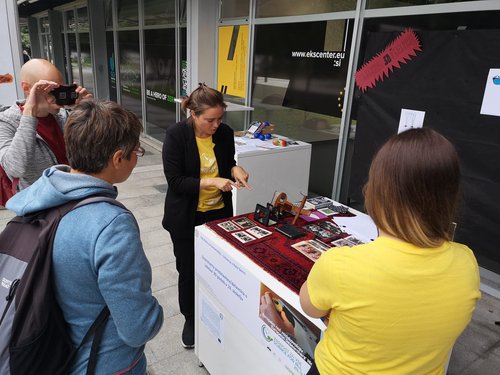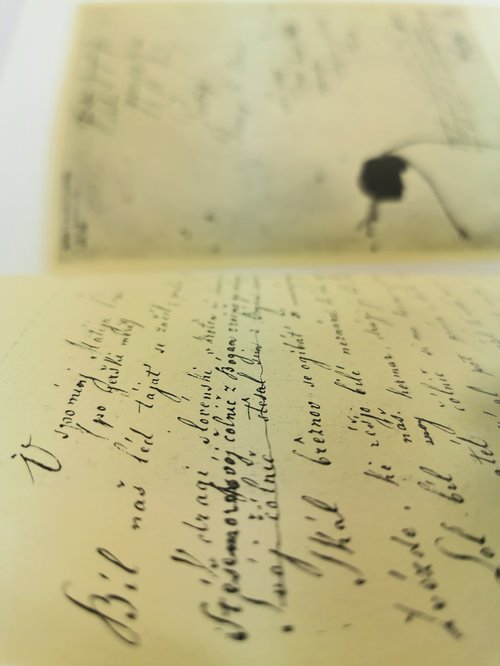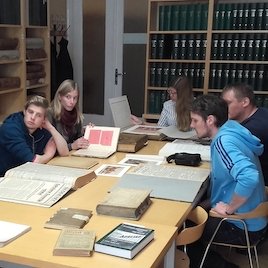Bachelor’s study programme Cultural History (first cycle) (admission until 2022/23)
| Study programme: | Bachelor's study programme Cultural history (1st level) |
|---|---|
| Main fields of study: | History |
| Programme code: | 1KZ |
| Programme cycle: | First cycle academic degree |
| Name of the qualification: | Diploma |
| Qualification title: | diplomirani zgodovinar (UN) oziroma diplomirana zgodovinarka (UN) |
| Qualification abbreviation: | dipl. zgod. (UN) |
| Final examination: | no |
| Dean: | prof. dr. Franc Marušič |
Programme description
The Cultural History program is an undergraduate study program leading to a university degree. The program covers all important topics in history science.
Employment Opportunities
Graduates with a Master’s degree from the School of Humanities in the Humanities Studies programme have broad employment prospects across fields that encompass all three study tracks – Linguistics, Literary Science, and History and Cultures of Crossborder Spaces. In the field of cultural heritage, graduates can work as curators, archivists, and experts in researching and promoting cultural and historical cross-border content in museums, archives, and cultural centres or institutions (libraries, galleries, cinemas). In the media and publishing sector, they may establish themselves as editors, journalists, proofreaders, and language consultants. They can also be employed in the public sector and non-governmental organizations as experts in intercultural cooperation, analysis of cultural processes, and the implementation of cross-border cooperation and social development projects. After their studies, they can upgrade their knowledge with pedagogical training and become employed in the education sector as teachers of linguistic, literary, and historical subjects.
In the field of culture and the arts, they may also work as self-employed professionals in culture. They can contribute to selected productions and projects requiring interpreters of cultural heritage, screenwriters, editors, proofreaders, or establish themselves as writers or creators of programmes for radio and television. Some of these professional profiles have long been considered shortage occupations in the cultural field – for example, critics/reviewers, meaning they are in particularly high demand in the labour market.
Additionally, they may work as researchers in scientific and development projects, where their in-depth humanistic knowledge of linguistic, literary, and cultural-historical processes and acquired practical skills contribute to the development of new solutions and scientific findings. They may continue their studies at the doctoral level and work as assistants and young researchers at higher education institutions and research centres.
Admission requirements
Admission to this program is open to students who:
- have passed the secondary school-leaving exam (matura)
- had completed any secondary school program before June 1, 1995
- have passed the final examination following a suitable vocational secondary school (vocational matura) in the field of: Early childhood education or Economic technician and an exam in History as part of the general matura exam. If the candidate passed the subject of History in the vocational matura exam, the candidate must also complete an exam in one of the matura subjects of Geography, Art history or Sociology; the chosen subject must not be the one that the candidate has taken as part of the vocational matura.
If admission is subject to a quota, candidates with matura will be selected based on the following criteria:
- overall achievement at the matura (60% of points)
- overall achievement in the third and the fourth year of a secondary school (40% of points)
Candidates with poklicna matura will be selected based on the following criteria:
- overall achievement at the poklicna matura (60% of points)
- overall achievement in the third and the fourth year of a secondary school (30% of points)
- grade achieved in a selected matura subject (10% of points)
Educational and professional goals
Temeljni cilj študijskega programa je izobraziti strokovnjake, ki bodo sposobni privzeti dela na , kjer je potrebno obvladovanje kulturnozgodovinskih znanj in veščin, ki jih zahtevajo pomožne zgodovinske vede. Najpomembnejša med njimi so tista, ki so povezana z varovanjem nepremične in premične kulturne dediščine (arhivarstvo, muzealstvo, dokumentaristika), z ohranjanjem naravne dediščine v pogojih, ki jih definira urbanizirana civilizacija, in z najraznovrstnejšim raziskovanjem preteklosti (od poljudnejšega na časnikarski ravni do zahtevnejšega domovinoznanstva in vrhunskega znanstvenega preučevanja).
Cilj izobraževanja po predlaganem programu je oblikovati diplomanta kot strokovno celovito osebnost, ki je sposobna razumeti in obvladovati zahtevna vprašanja kulturne zgodovine kot samostojne in enkratne pojave. Od diplomanta lahko pričakujemo uspešno preučevanje kulturnozgodovinskih vprašanj v odnosu do splošnih in specifičnih pojavov, ki so še posebej izraziti na stičišču različnih kulturnih in nacionalnih prostorov. Diplomant bo sposoben vzpostaviti celovite in tvorne odnose med strokovnjaki iz različnih znanstvenih diciplin, ki morajo nujno sodelovati pri reševanju praktičnih in raziskovalnih problemov na področju kulturne zgodovine. Usposobljen bo tudi za samostojno aplikativno delo.
Access to further studies
Graduates may continue with graduate study programs on condition that they meet the recommendations of the university offering graduate studies.
Assessment
Oblike preverjanja in ocenjevanja znanja pri posameznih predmetih so naslednje: pisni izpiti, ustni izpiti, kolokviji in seminarske naloge. Uspešno opravljene obveznosti iz vaj in seminarskih nalog so pogoj za pristop k izpitu. Študent zaključi študij z zagovorom diplomske naloge pred tričlansko komisijo.
Courses refresh
1. year
2. year
3. year
| Compulsory courses | Hours | ECTS |
|---|---|---|
| Agricultural History | 240 | 8 |
| Basic Sciences of History | 240 | 8 |
| Diploma Thesis | 360 | 12 |
| Europe in the Period of Revolutions | 240 | 8 |
| History of Historiography | 240 | 8 |
| Practical Placement | 80 | 4 |
| General elective courses | Hours | ECTS |
| Archivistics | 120 | 4 |
| Critical Writing in Art | 130 | 4 |
| Cultural heritage in historical perspective | 120 | 4 |
| Digital humanities | 120 | 4 |
| Friulian language | 120 | 4 |
| Gender in the age of modernity* | 120 | 4 |
| History and literature | 120 | 4 |
| History of Science | 120 | 4 |
| Introduction to Diaspora Studies: Historical and Contemporary Perspectives | 120 | 4 |
| Memory and History | 120 | 4 |
| Physical Culture, Sport and Olympics in the History | 120 | 4 |
| Selected Chapters of the Political and Cultural History of Southeastern Europe | 120 | 4 |
| Selected Topics in Cultural History | 120 | 4 |
| Selected chapters from political in cultural history of Yugoslavia | 120 | 4 |
| Selected chapters in the history of viticulture and enology | 90 | 4 |
| The Methodology of the Empirical Work in the Humanities | 120 | 4 |



